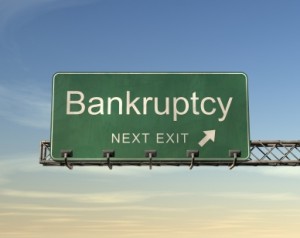Dissecting Bankruptcy: Should You File For Chapter 7 or Chapter 13?
So let’s be honest for a moment. As we’ve detailed on this blog time and again, the US economy isn’t what it used to be. The heyday of free money and endless revenue streams seem to be at an end, for now at least. And though economists, financial analysts, and the US government project that this country is on the road to economic recovery, for those of us already affected by the poor economy, and I suspect that there are many who fall into this category, the damage is already done and the only road left is toward financial ruin.
Hope that wasn’t too much wordplay for you, I’m trying to curb it.
Anyway, if you’ve already been paid a visit by this awful economy, than all this talk about the country rebounding won’t resonate much for you. Sure it likely means that eventually you’ll be able to secure a new job or see your business become profitable again as consumers begin to consume once more; but the difficult truth is that this information will probably be little solstice or an effective remedy in curing your immediate problems. Those problems being that you are broke or heavily indebted.
So what do you do? Well, why not take a page out of the CEOs’ playbook and ask the government for help? Now I don’t mean you need to lobby congress for a bailout (though that’d be nice). You have an easier option: bankruptcy.
Sounds extreme, I know. But there’s a reason why we have such a law in place: to help people in dire financial situations. It’s no surprise that many people are taking this option nowadays, a quick scan on LegalMatch’s latest case intake statistics show a spike in referrals to bankruptcy lawyers.
But what is bankruptcy? No answers? Okay, I’ll field this one. Bankruptcy is a court process in which an individual or business declares they’re insolvent (meaning that they are no longer able to pay their debts) and seek to discharge their debt with the help of the court. It allows the party in debt to have relief from their debt and creditors, while also attempting to put creditors back in their original financial position. In the US, there are two forms of consumer bankruptcy: Chapter 7 bankruptcy and Chapter 13 bankruptcy.
Filing for Chapter 7, aka liquidation bankruptcy, results in the debt holder’s property being seized by a court-appointed trustee who determines what property can be sold to pay off debts. This sounds scary, but usually most of the debt holder’s property is exempt from seizing, such as homes, vehicles, insurance policies and so forth. Any debt that is paid off is then simply released from the debt holder and he or she is no longer responsible for paying it, and creditors may no longer try and collect those debts.
Filing for Chapter 13 is essentially like a debt consolidation loan, just that instead of a new party paying off all your debt and being subjected to new loan payments to one single source, the court forces you to organized all your debts and assets which will paid over time to your creditors. The debt holder must submit a payment plan to the court that shows how the debt will be paid off over the next three to five years, and if the plan is approved, then payments may begin.
So which form of bankruptcy is right for you? LegalMatch has a few guidelines to help you decide, however the best way to decide is to sit down with a bankruptcy attorney and/or financial advisor:
Chapter 7 bankruptcy is usually best for people who:
- Have no steady stream of income
- Have a lot of exempt property
- Cannot keep up with a strict payment plan
Chapter 13 bankruptcy is usually best for people who:
- Do not want to lose their property (including real estate, cars, and personal property)
- Have a lot of nonexempt property
- Have a steady stream of income and can eventually pay of their debts
- Can live with a strict budget and adhere to a strict payment plan
Lastly, before I bid you adieu, I think it’s important to dispel some myths about filing for bankruptcy. The biggest and most emphasized myth is that filing for bankruptcy will destroy your credit score. This is one of the primary reasons why people try to avoid it at all costs. Though filing for bankruptcy can result in a huge drop to your credit score, it’s not the end of the world. A declaration of bankruptcy can only stay in your credit report for 10 years.
Now that sounds like a long time, and it is, but like any drastic measure that is undertaken, before you do it, it must be put into the proper context. After you file for bankruptcy, you can start to repair your credit score by simply paying for your bills on time; this will go a long way in healing you credit score. But most important of all, if you consider the alternative, not filing for bankruptcy could damage your credit score even more. For instance, if you already don’t have the money to pay off your growing debt, all that will happen is that it will accumulate and chances are eventually it may balloon to a point where it’s completely unmanageable and you’re just missing payments entirely. Now tell me, which scenario sounds worst for your credit?
There are also plenty of moral issues that come with filing bankruptcy, too. But without getting too far into this area, I’ll just say that ultimately when you’re faced with a decision that can help save you financial stability, is it really immoral to get some help in doing so?
Whatever you decide to do, and I can’t emphasize this enough, sit down with a qualified financial specialist or bankruptcy lawyer and plan it out first.

Comments